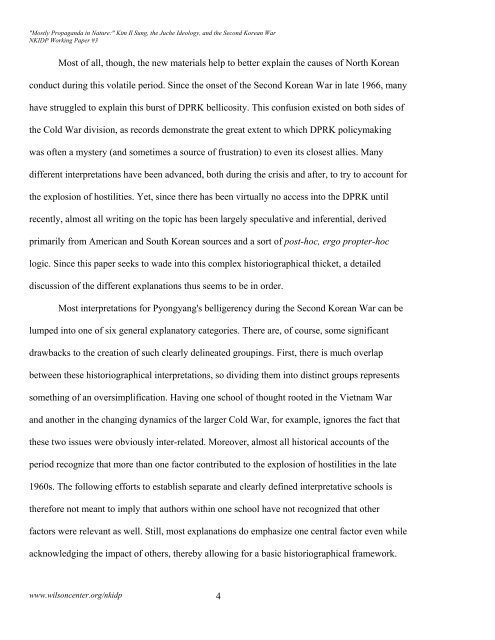"Mostly Propaganda in Nature:" Kim Il Sung, the Juche Ideology, and ...
"Mostly Propaganda in Nature:" Kim Il Sung, the Juche Ideology, and ...
"Mostly Propaganda in Nature:" Kim Il Sung, the Juche Ideology, and ...
You also want an ePaper? Increase the reach of your titles
YUMPU automatically turns print PDFs into web optimized ePapers that Google loves.
"<strong>Mostly</strong> <strong>Propag<strong>and</strong>a</strong> <strong>in</strong> <strong>Nature</strong>:" <strong>Kim</strong> <strong>Il</strong> <strong>Sung</strong>, <strong>the</strong> <strong>Juche</strong> <strong>Ideology</strong>, <strong>and</strong> <strong>the</strong> Second Korean War<br />
NKIDP Work<strong>in</strong>g Paper #3<br />
Most of all, though, <strong>the</strong> new materials help to better expla<strong>in</strong> <strong>the</strong> causes of North Korean<br />
conduct dur<strong>in</strong>g this volatile period. S<strong>in</strong>ce <strong>the</strong> onset of <strong>the</strong> Second Korean War <strong>in</strong> late 1966, many<br />
have struggled to expla<strong>in</strong> this burst of DPRK bellicosity. This confusion existed on both sides of<br />
<strong>the</strong> Cold War division, as records demonstrate <strong>the</strong> great extent to which DPRK policymak<strong>in</strong>g<br />
was often a mystery (<strong>and</strong> sometimes a source of frustration) to even its closest allies. Many<br />
different <strong>in</strong>terpretations have been advanced, both dur<strong>in</strong>g <strong>the</strong> crisis <strong>and</strong> after, to try to account for<br />
<strong>the</strong> explosion of hostilities. Yet, s<strong>in</strong>ce <strong>the</strong>re has been virtually no access <strong>in</strong>to <strong>the</strong> DPRK until<br />
recently, almost all writ<strong>in</strong>g on <strong>the</strong> topic has been largely speculative <strong>and</strong> <strong>in</strong>ferential, derived<br />
primarily from American <strong>and</strong> South Korean sources <strong>and</strong> a sort of post-hoc, ergo propter-hoc<br />
logic. S<strong>in</strong>ce this paper seeks to wade <strong>in</strong>to this complex historiographical thicket, a detailed<br />
discussion of <strong>the</strong> different explanations thus seems to be <strong>in</strong> order.<br />
Most <strong>in</strong>terpretations for Pyongyang's belligerency dur<strong>in</strong>g <strong>the</strong> Second Korean War can be<br />
lumped <strong>in</strong>to one of six general explanatory categories. There are, of course, some significant<br />
drawbacks to <strong>the</strong> creation of such clearly del<strong>in</strong>eated group<strong>in</strong>gs. First, <strong>the</strong>re is much overlap<br />
between <strong>the</strong>se historiographical <strong>in</strong>terpretations, so divid<strong>in</strong>g <strong>the</strong>m <strong>in</strong>to dist<strong>in</strong>ct groups represents<br />
someth<strong>in</strong>g of an oversimplification. Hav<strong>in</strong>g one school of thought rooted <strong>in</strong> <strong>the</strong> Vietnam War<br />
<strong>and</strong> ano<strong>the</strong>r <strong>in</strong> <strong>the</strong> chang<strong>in</strong>g dynamics of <strong>the</strong> larger Cold War, for example, ignores <strong>the</strong> fact that<br />
<strong>the</strong>se two issues were obviously <strong>in</strong>ter-related. Moreover, almost all historical accounts of <strong>the</strong><br />
period recognize that more than one factor contributed to <strong>the</strong> explosion of hostilities <strong>in</strong> <strong>the</strong> late<br />
1960s. The follow<strong>in</strong>g efforts to establish separate <strong>and</strong> clearly def<strong>in</strong>ed <strong>in</strong>terpretative schools is<br />
<strong>the</strong>refore not meant to imply that authors with<strong>in</strong> one school have not recognized that o<strong>the</strong>r<br />
factors were relevant as well. Still, most explanations do emphasize one central factor even while<br />
acknowledg<strong>in</strong>g <strong>the</strong> impact of o<strong>the</strong>rs, <strong>the</strong>reby allow<strong>in</strong>g for a basic historiographical framework.<br />
www.wilsoncenter.org/nkidp 4

















